Policy and Advocacy Report: ACA Repeal's Impact on Healthcare Access
VerifiedAdded on 2022/11/18
|8
|1960
|211
Report
AI Summary
This report provides an in-depth analysis of the legislative proposal to repeal the Affordable Care Act (ACA). It begins with an introduction to the role of nurses in healthcare advocacy and then presents a legislative comparison grid, examining the ACA's intent, target population, opponents, and the bill's process. The report highlights the criticisms of the ACA, particularly the individual mandate and rising healthcare costs. Part 2 offers an advocacy statement against the repeal, emphasizing the ACA's role in providing subsidized healthcare and its impact on reducing the number of uninsured Americans. It also suggests amendments, such as eliminating ACA-related fees and taxes, and replacing the individual mandate with continuous coverage requirements. The report concludes by reiterating the importance of RNs advocating against the repeal, referencing resources like the ANA. The analysis underscores the potential negative impacts of the repeal on healthcare access, particularly for economically disadvantaged groups.
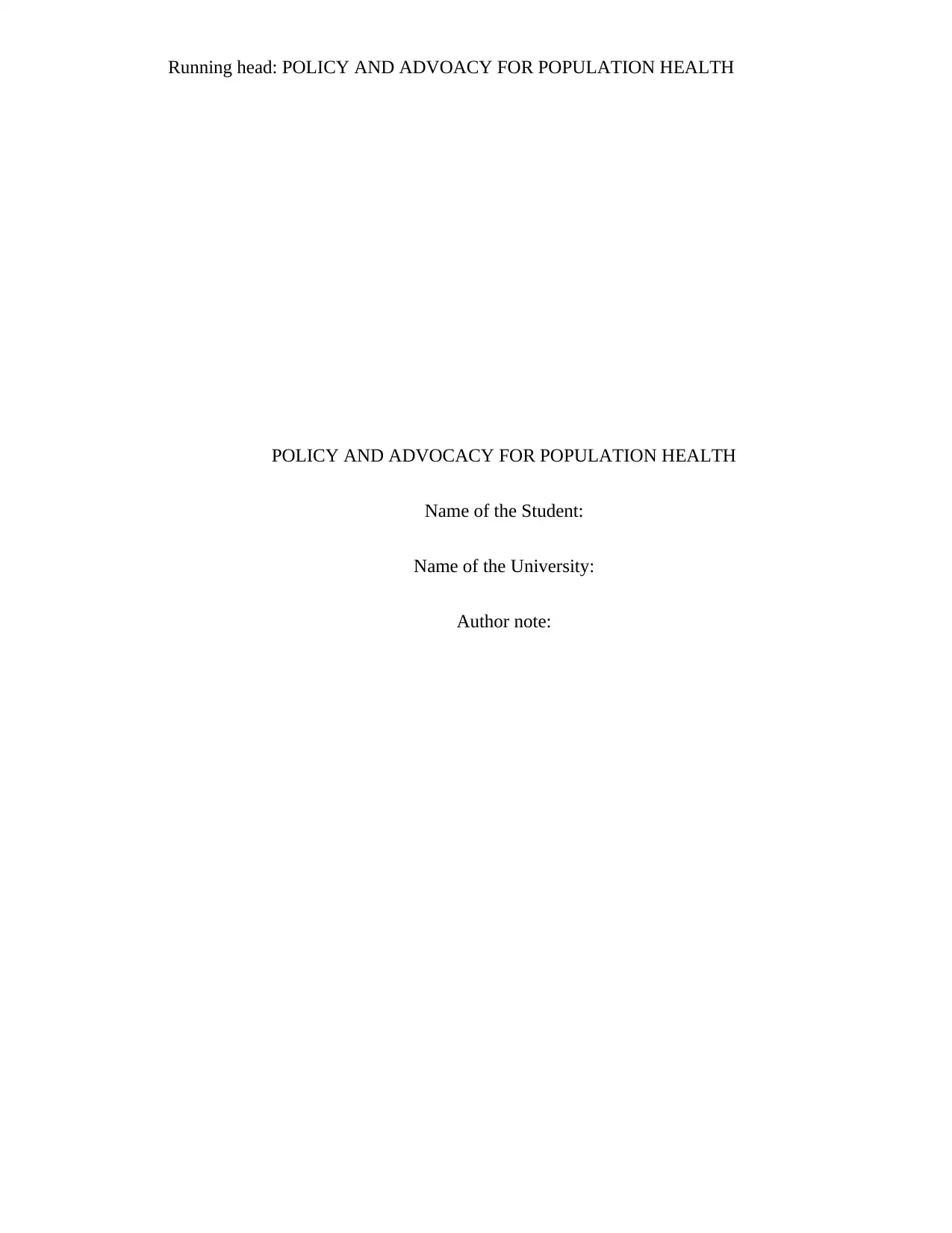
Running head: POLICY AND ADVOACY FOR POPULATION HEALTH
POLICY AND ADVOCACY FOR POPULATION HEALTH
Name of the Student:
Name of the University:
Author note:
POLICY AND ADVOCACY FOR POPULATION HEALTH
Name of the Student:
Name of the University:
Author note:
Paraphrase This Document
Need a fresh take? Get an instant paraphrase of this document with our AI Paraphraser
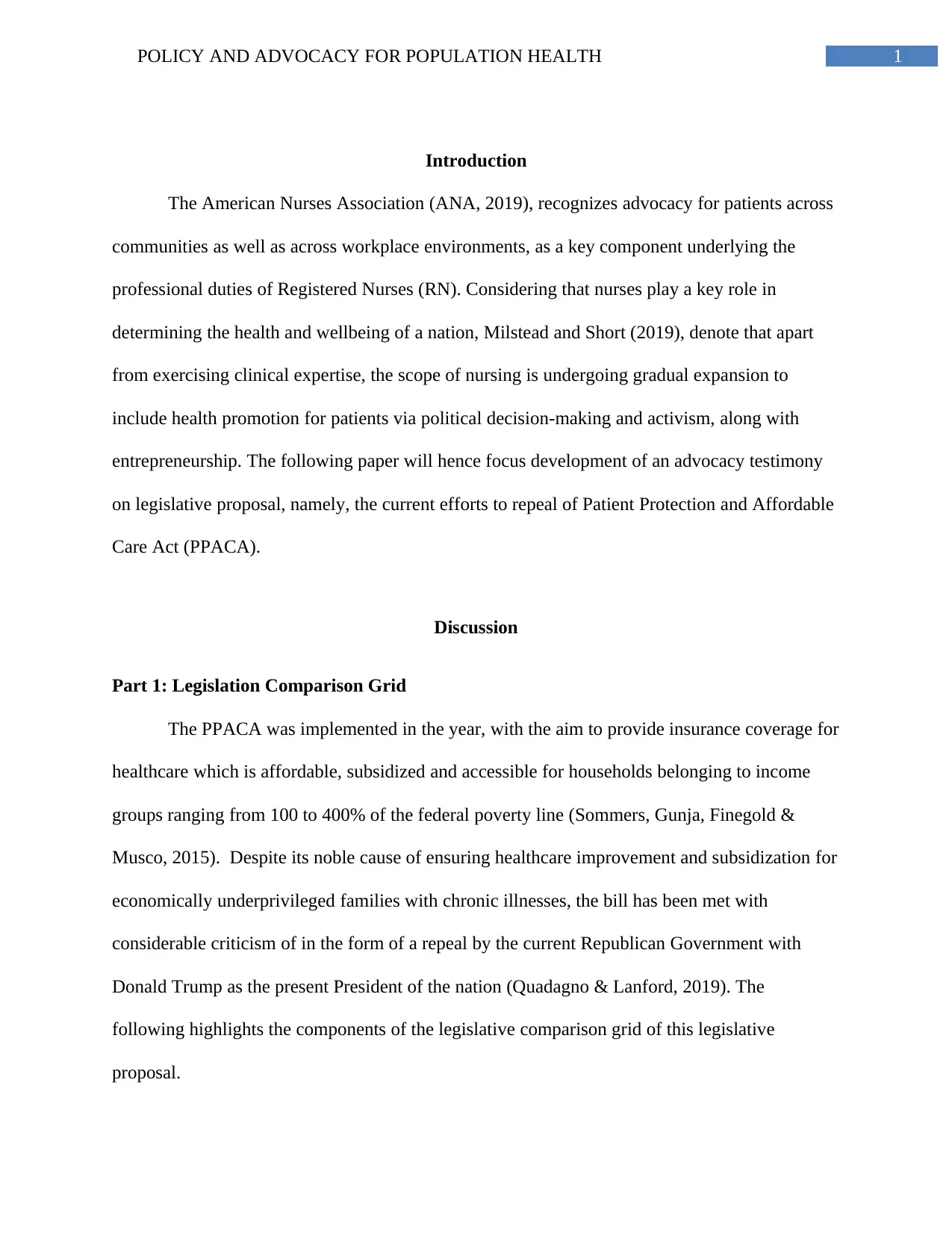
1POLICY AND ADVOCACY FOR POPULATION HEALTH
Introduction
The American Nurses Association (ANA, 2019), recognizes advocacy for patients across
communities as well as across workplace environments, as a key component underlying the
professional duties of Registered Nurses (RN). Considering that nurses play a key role in
determining the health and wellbeing of a nation, Milstead and Short (2019), denote that apart
from exercising clinical expertise, the scope of nursing is undergoing gradual expansion to
include health promotion for patients via political decision-making and activism, along with
entrepreneurship. The following paper will hence focus development of an advocacy testimony
on legislative proposal, namely, the current efforts to repeal of Patient Protection and Affordable
Care Act (PPACA).
Discussion
Part 1: Legislation Comparison Grid
The PPACA was implemented in the year, with the aim to provide insurance coverage for
healthcare which is affordable, subsidized and accessible for households belonging to income
groups ranging from 100 to 400% of the federal poverty line (Sommers, Gunja, Finegold &
Musco, 2015). Despite its noble cause of ensuring healthcare improvement and subsidization for
economically underprivileged families with chronic illnesses, the bill has been met with
considerable criticism of in the form of a repeal by the current Republican Government with
Donald Trump as the present President of the nation (Quadagno & Lanford, 2019). The
following highlights the components of the legislative comparison grid of this legislative
proposal.
Introduction
The American Nurses Association (ANA, 2019), recognizes advocacy for patients across
communities as well as across workplace environments, as a key component underlying the
professional duties of Registered Nurses (RN). Considering that nurses play a key role in
determining the health and wellbeing of a nation, Milstead and Short (2019), denote that apart
from exercising clinical expertise, the scope of nursing is undergoing gradual expansion to
include health promotion for patients via political decision-making and activism, along with
entrepreneurship. The following paper will hence focus development of an advocacy testimony
on legislative proposal, namely, the current efforts to repeal of Patient Protection and Affordable
Care Act (PPACA).
Discussion
Part 1: Legislation Comparison Grid
The PPACA was implemented in the year, with the aim to provide insurance coverage for
healthcare which is affordable, subsidized and accessible for households belonging to income
groups ranging from 100 to 400% of the federal poverty line (Sommers, Gunja, Finegold &
Musco, 2015). Despite its noble cause of ensuring healthcare improvement and subsidization for
economically underprivileged families with chronic illnesses, the bill has been met with
considerable criticism of in the form of a repeal by the current Republican Government with
Donald Trump as the present President of the nation (Quadagno & Lanford, 2019). The
following highlights the components of the legislative comparison grid of this legislative
proposal.
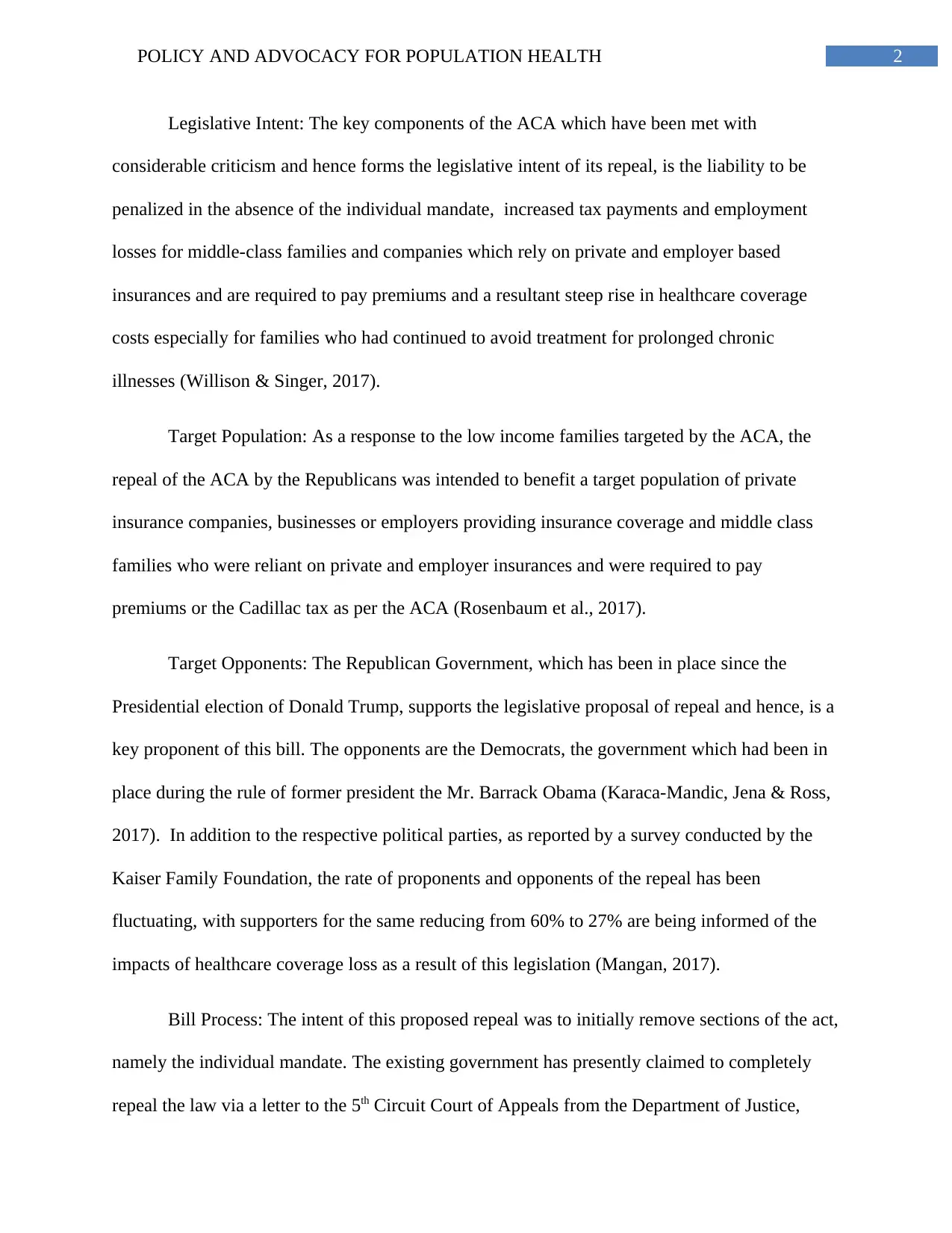
2POLICY AND ADVOCACY FOR POPULATION HEALTH
Legislative Intent: The key components of the ACA which have been met with
considerable criticism and hence forms the legislative intent of its repeal, is the liability to be
penalized in the absence of the individual mandate, increased tax payments and employment
losses for middle-class families and companies which rely on private and employer based
insurances and are required to pay premiums and a resultant steep rise in healthcare coverage
costs especially for families who had continued to avoid treatment for prolonged chronic
illnesses (Willison & Singer, 2017).
Target Population: As a response to the low income families targeted by the ACA, the
repeal of the ACA by the Republicans was intended to benefit a target population of private
insurance companies, businesses or employers providing insurance coverage and middle class
families who were reliant on private and employer insurances and were required to pay
premiums or the Cadillac tax as per the ACA (Rosenbaum et al., 2017).
Target Opponents: The Republican Government, which has been in place since the
Presidential election of Donald Trump, supports the legislative proposal of repeal and hence, is a
key proponent of this bill. The opponents are the Democrats, the government which had been in
place during the rule of former president the Mr. Barrack Obama (Karaca-Mandic, Jena & Ross,
2017). In addition to the respective political parties, as reported by a survey conducted by the
Kaiser Family Foundation, the rate of proponents and opponents of the repeal has been
fluctuating, with supporters for the same reducing from 60% to 27% are being informed of the
impacts of healthcare coverage loss as a result of this legislation (Mangan, 2017).
Bill Process: The intent of this proposed repeal was to initially remove sections of the act,
namely the individual mandate. The existing government has presently claimed to completely
repeal the law via a letter to the 5th Circuit Court of Appeals from the Department of Justice,
Legislative Intent: The key components of the ACA which have been met with
considerable criticism and hence forms the legislative intent of its repeal, is the liability to be
penalized in the absence of the individual mandate, increased tax payments and employment
losses for middle-class families and companies which rely on private and employer based
insurances and are required to pay premiums and a resultant steep rise in healthcare coverage
costs especially for families who had continued to avoid treatment for prolonged chronic
illnesses (Willison & Singer, 2017).
Target Population: As a response to the low income families targeted by the ACA, the
repeal of the ACA by the Republicans was intended to benefit a target population of private
insurance companies, businesses or employers providing insurance coverage and middle class
families who were reliant on private and employer insurances and were required to pay
premiums or the Cadillac tax as per the ACA (Rosenbaum et al., 2017).
Target Opponents: The Republican Government, which has been in place since the
Presidential election of Donald Trump, supports the legislative proposal of repeal and hence, is a
key proponent of this bill. The opponents are the Democrats, the government which had been in
place during the rule of former president the Mr. Barrack Obama (Karaca-Mandic, Jena & Ross,
2017). In addition to the respective political parties, as reported by a survey conducted by the
Kaiser Family Foundation, the rate of proponents and opponents of the repeal has been
fluctuating, with supporters for the same reducing from 60% to 27% are being informed of the
impacts of healthcare coverage loss as a result of this legislation (Mangan, 2017).
Bill Process: The intent of this proposed repeal was to initially remove sections of the act,
namely the individual mandate. The existing government has presently claimed to completely
repeal the law via a letter to the 5th Circuit Court of Appeals from the Department of Justice,
⊘ This is a preview!⊘
Do you want full access?
Subscribe today to unlock all pages.

Trusted by 1+ million students worldwide
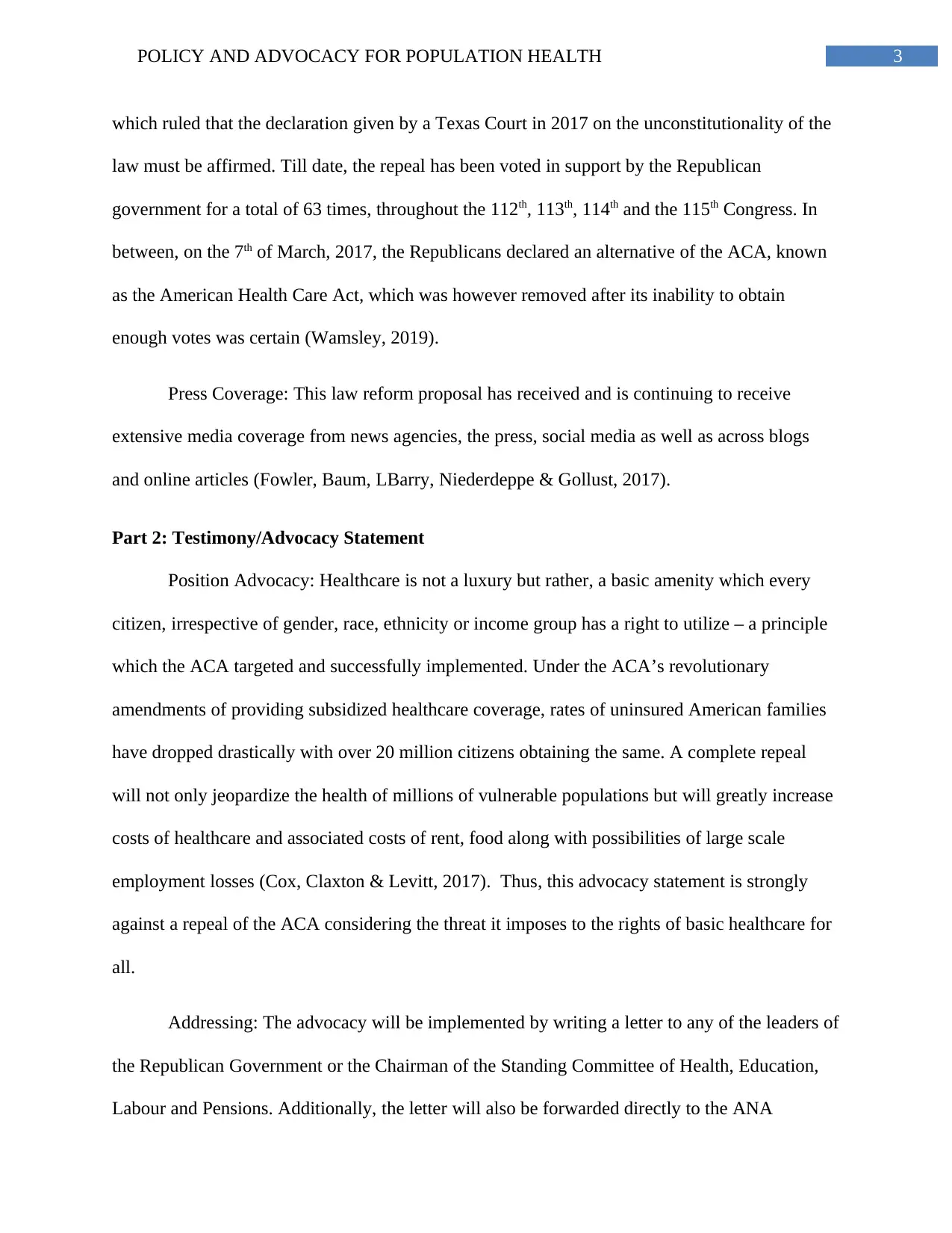
3POLICY AND ADVOCACY FOR POPULATION HEALTH
which ruled that the declaration given by a Texas Court in 2017 on the unconstitutionality of the
law must be affirmed. Till date, the repeal has been voted in support by the Republican
government for a total of 63 times, throughout the 112th, 113th, 114th and the 115th Congress. In
between, on the 7th of March, 2017, the Republicans declared an alternative of the ACA, known
as the American Health Care Act, which was however removed after its inability to obtain
enough votes was certain (Wamsley, 2019).
Press Coverage: This law reform proposal has received and is continuing to receive
extensive media coverage from news agencies, the press, social media as well as across blogs
and online articles (Fowler, Baum, LBarry, Niederdeppe & Gollust, 2017).
Part 2: Testimony/Advocacy Statement
Position Advocacy: Healthcare is not a luxury but rather, a basic amenity which every
citizen, irrespective of gender, race, ethnicity or income group has a right to utilize – a principle
which the ACA targeted and successfully implemented. Under the ACA’s revolutionary
amendments of providing subsidized healthcare coverage, rates of uninsured American families
have dropped drastically with over 20 million citizens obtaining the same. A complete repeal
will not only jeopardize the health of millions of vulnerable populations but will greatly increase
costs of healthcare and associated costs of rent, food along with possibilities of large scale
employment losses (Cox, Claxton & Levitt, 2017). Thus, this advocacy statement is strongly
against a repeal of the ACA considering the threat it imposes to the rights of basic healthcare for
all.
Addressing: The advocacy will be implemented by writing a letter to any of the leaders of
the Republican Government or the Chairman of the Standing Committee of Health, Education,
Labour and Pensions. Additionally, the letter will also be forwarded directly to the ANA
which ruled that the declaration given by a Texas Court in 2017 on the unconstitutionality of the
law must be affirmed. Till date, the repeal has been voted in support by the Republican
government for a total of 63 times, throughout the 112th, 113th, 114th and the 115th Congress. In
between, on the 7th of March, 2017, the Republicans declared an alternative of the ACA, known
as the American Health Care Act, which was however removed after its inability to obtain
enough votes was certain (Wamsley, 2019).
Press Coverage: This law reform proposal has received and is continuing to receive
extensive media coverage from news agencies, the press, social media as well as across blogs
and online articles (Fowler, Baum, LBarry, Niederdeppe & Gollust, 2017).
Part 2: Testimony/Advocacy Statement
Position Advocacy: Healthcare is not a luxury but rather, a basic amenity which every
citizen, irrespective of gender, race, ethnicity or income group has a right to utilize – a principle
which the ACA targeted and successfully implemented. Under the ACA’s revolutionary
amendments of providing subsidized healthcare coverage, rates of uninsured American families
have dropped drastically with over 20 million citizens obtaining the same. A complete repeal
will not only jeopardize the health of millions of vulnerable populations but will greatly increase
costs of healthcare and associated costs of rent, food along with possibilities of large scale
employment losses (Cox, Claxton & Levitt, 2017). Thus, this advocacy statement is strongly
against a repeal of the ACA considering the threat it imposes to the rights of basic healthcare for
all.
Addressing: The advocacy will be implemented by writing a letter to any of the leaders of
the Republican Government or the Chairman of the Standing Committee of Health, Education,
Labour and Pensions. Additionally, the letter will also be forwarded directly to the ANA
Paraphrase This Document
Need a fresh take? Get an instant paraphrase of this document with our AI Paraphraser
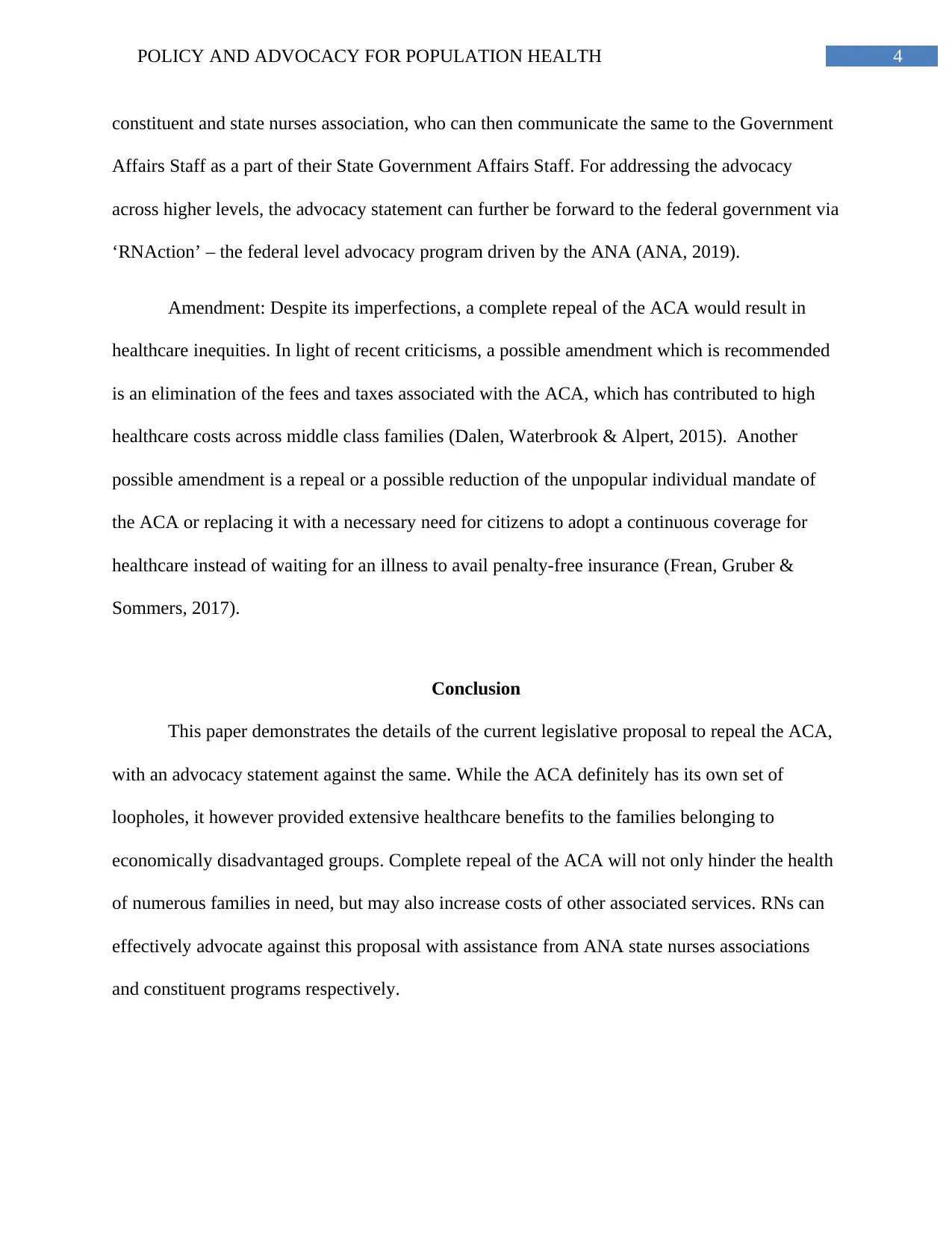
4POLICY AND ADVOCACY FOR POPULATION HEALTH
constituent and state nurses association, who can then communicate the same to the Government
Affairs Staff as a part of their State Government Affairs Staff. For addressing the advocacy
across higher levels, the advocacy statement can further be forward to the federal government via
‘RNAction’ – the federal level advocacy program driven by the ANA (ANA, 2019).
Amendment: Despite its imperfections, a complete repeal of the ACA would result in
healthcare inequities. In light of recent criticisms, a possible amendment which is recommended
is an elimination of the fees and taxes associated with the ACA, which has contributed to high
healthcare costs across middle class families (Dalen, Waterbrook & Alpert, 2015). Another
possible amendment is a repeal or a possible reduction of the unpopular individual mandate of
the ACA or replacing it with a necessary need for citizens to adopt a continuous coverage for
healthcare instead of waiting for an illness to avail penalty-free insurance (Frean, Gruber &
Sommers, 2017).
Conclusion
This paper demonstrates the details of the current legislative proposal to repeal the ACA,
with an advocacy statement against the same. While the ACA definitely has its own set of
loopholes, it however provided extensive healthcare benefits to the families belonging to
economically disadvantaged groups. Complete repeal of the ACA will not only hinder the health
of numerous families in need, but may also increase costs of other associated services. RNs can
effectively advocate against this proposal with assistance from ANA state nurses associations
and constituent programs respectively.
constituent and state nurses association, who can then communicate the same to the Government
Affairs Staff as a part of their State Government Affairs Staff. For addressing the advocacy
across higher levels, the advocacy statement can further be forward to the federal government via
‘RNAction’ – the federal level advocacy program driven by the ANA (ANA, 2019).
Amendment: Despite its imperfections, a complete repeal of the ACA would result in
healthcare inequities. In light of recent criticisms, a possible amendment which is recommended
is an elimination of the fees and taxes associated with the ACA, which has contributed to high
healthcare costs across middle class families (Dalen, Waterbrook & Alpert, 2015). Another
possible amendment is a repeal or a possible reduction of the unpopular individual mandate of
the ACA or replacing it with a necessary need for citizens to adopt a continuous coverage for
healthcare instead of waiting for an illness to avail penalty-free insurance (Frean, Gruber &
Sommers, 2017).
Conclusion
This paper demonstrates the details of the current legislative proposal to repeal the ACA,
with an advocacy statement against the same. While the ACA definitely has its own set of
loopholes, it however provided extensive healthcare benefits to the families belonging to
economically disadvantaged groups. Complete repeal of the ACA will not only hinder the health
of numerous families in need, but may also increase costs of other associated services. RNs can
effectively advocate against this proposal with assistance from ANA state nurses associations
and constituent programs respectively.
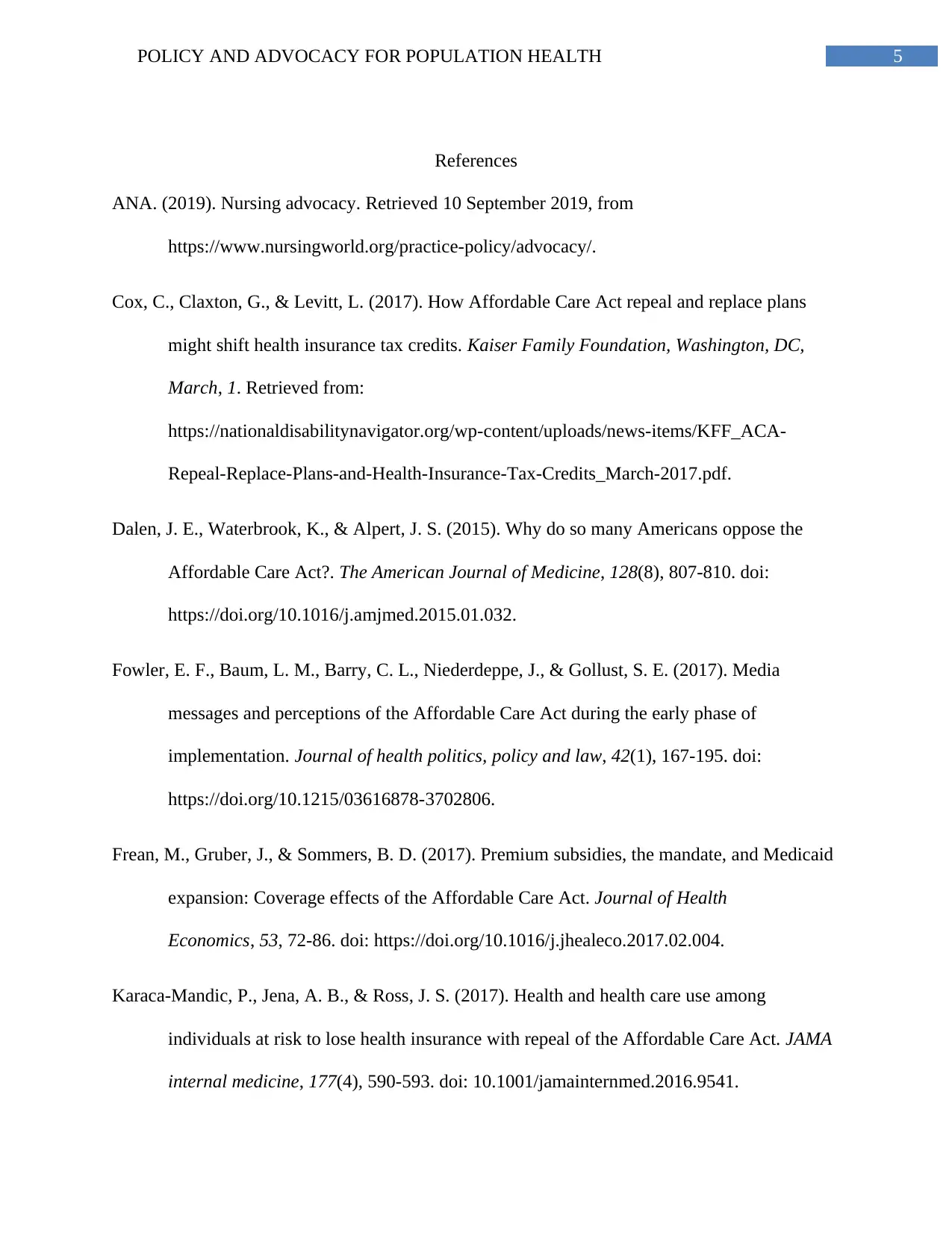
5POLICY AND ADVOCACY FOR POPULATION HEALTH
References
ANA. (2019). Nursing advocacy. Retrieved 10 September 2019, from
https://www.nursingworld.org/practice-policy/advocacy/.
Cox, C., Claxton, G., & Levitt, L. (2017). How Affordable Care Act repeal and replace plans
might shift health insurance tax credits. Kaiser Family Foundation, Washington, DC,
March, 1. Retrieved from:
https://nationaldisabilitynavigator.org/wp-content/uploads/news-items/KFF_ACA-
Repeal-Replace-Plans-and-Health-Insurance-Tax-Credits_March-2017.pdf.
Dalen, J. E., Waterbrook, K., & Alpert, J. S. (2015). Why do so many Americans oppose the
Affordable Care Act?. The American Journal of Medicine, 128(8), 807-810. doi:
https://doi.org/10.1016/j.amjmed.2015.01.032.
Fowler, E. F., Baum, L. M., Barry, C. L., Niederdeppe, J., & Gollust, S. E. (2017). Media
messages and perceptions of the Affordable Care Act during the early phase of
implementation. Journal of health politics, policy and law, 42(1), 167-195. doi:
https://doi.org/10.1215/03616878-3702806.
Frean, M., Gruber, J., & Sommers, B. D. (2017). Premium subsidies, the mandate, and Medicaid
expansion: Coverage effects of the Affordable Care Act. Journal of Health
Economics, 53, 72-86. doi: https://doi.org/10.1016/j.jhealeco.2017.02.004.
Karaca-Mandic, P., Jena, A. B., & Ross, J. S. (2017). Health and health care use among
individuals at risk to lose health insurance with repeal of the Affordable Care Act. JAMA
internal medicine, 177(4), 590-593. doi: 10.1001/jamainternmed.2016.9541.
References
ANA. (2019). Nursing advocacy. Retrieved 10 September 2019, from
https://www.nursingworld.org/practice-policy/advocacy/.
Cox, C., Claxton, G., & Levitt, L. (2017). How Affordable Care Act repeal and replace plans
might shift health insurance tax credits. Kaiser Family Foundation, Washington, DC,
March, 1. Retrieved from:
https://nationaldisabilitynavigator.org/wp-content/uploads/news-items/KFF_ACA-
Repeal-Replace-Plans-and-Health-Insurance-Tax-Credits_March-2017.pdf.
Dalen, J. E., Waterbrook, K., & Alpert, J. S. (2015). Why do so many Americans oppose the
Affordable Care Act?. The American Journal of Medicine, 128(8), 807-810. doi:
https://doi.org/10.1016/j.amjmed.2015.01.032.
Fowler, E. F., Baum, L. M., Barry, C. L., Niederdeppe, J., & Gollust, S. E. (2017). Media
messages and perceptions of the Affordable Care Act during the early phase of
implementation. Journal of health politics, policy and law, 42(1), 167-195. doi:
https://doi.org/10.1215/03616878-3702806.
Frean, M., Gruber, J., & Sommers, B. D. (2017). Premium subsidies, the mandate, and Medicaid
expansion: Coverage effects of the Affordable Care Act. Journal of Health
Economics, 53, 72-86. doi: https://doi.org/10.1016/j.jhealeco.2017.02.004.
Karaca-Mandic, P., Jena, A. B., & Ross, J. S. (2017). Health and health care use among
individuals at risk to lose health insurance with repeal of the Affordable Care Act. JAMA
internal medicine, 177(4), 590-593. doi: 10.1001/jamainternmed.2016.9541.
⊘ This is a preview!⊘
Do you want full access?
Subscribe today to unlock all pages.

Trusted by 1+ million students worldwide
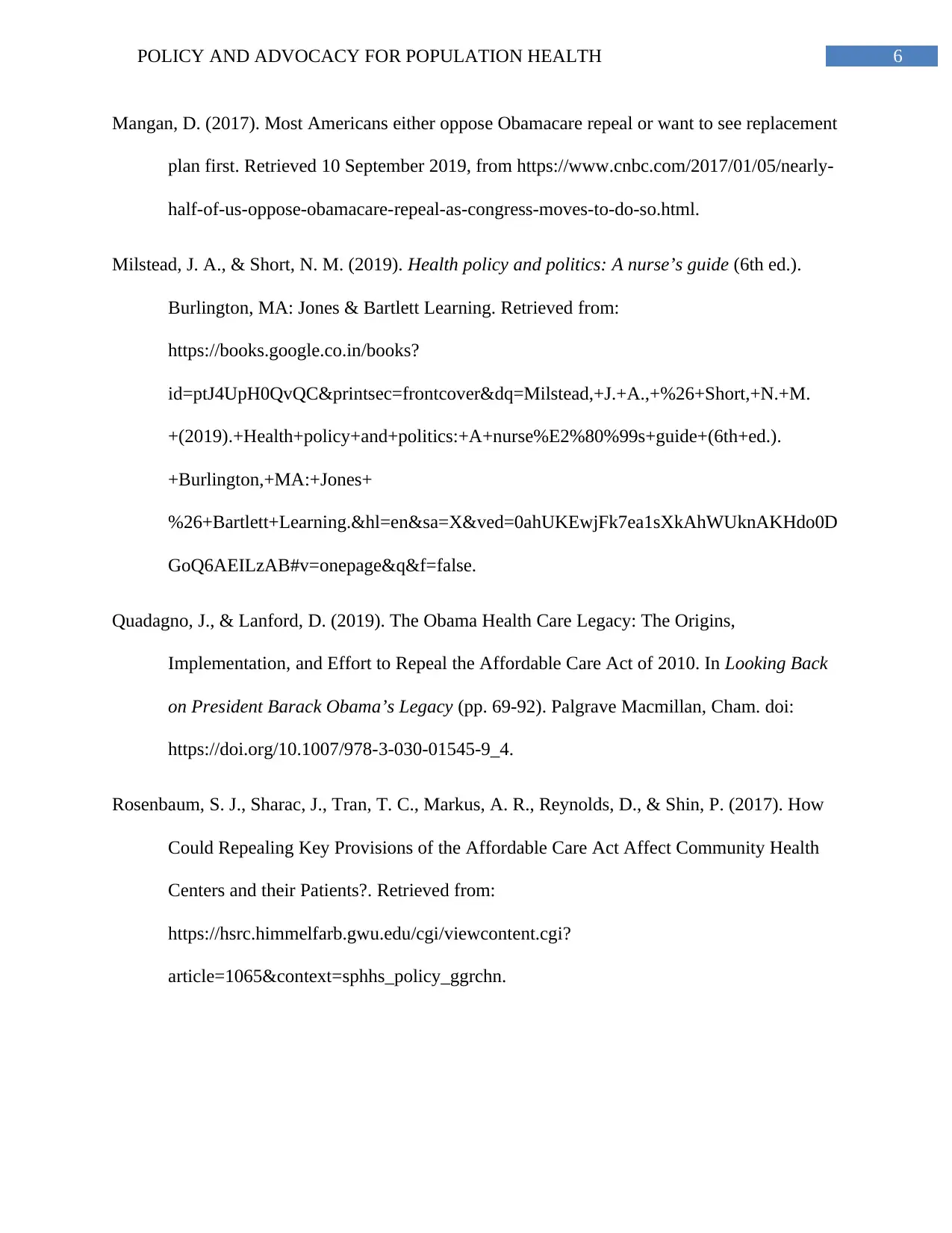
6POLICY AND ADVOCACY FOR POPULATION HEALTH
Mangan, D. (2017). Most Americans either oppose Obamacare repeal or want to see replacement
plan first. Retrieved 10 September 2019, from https://www.cnbc.com/2017/01/05/nearly-
half-of-us-oppose-obamacare-repeal-as-congress-moves-to-do-so.html.
Milstead, J. A., & Short, N. M. (2019). Health policy and politics: A nurse’s guide (6th ed.).
Burlington, MA: Jones & Bartlett Learning. Retrieved from:
https://books.google.co.in/books?
id=ptJ4UpH0QvQC&printsec=frontcover&dq=Milstead,+J.+A.,+%26+Short,+N.+M.
+(2019).+Health+policy+and+politics:+A+nurse%E2%80%99s+guide+(6th+ed.).
+Burlington,+MA:+Jones+
%26+Bartlett+Learning.&hl=en&sa=X&ved=0ahUKEwjFk7ea1sXkAhWUknAKHdo0D
GoQ6AEILzAB#v=onepage&q&f=false.
Quadagno, J., & Lanford, D. (2019). The Obama Health Care Legacy: The Origins,
Implementation, and Effort to Repeal the Affordable Care Act of 2010. In Looking Back
on President Barack Obama’s Legacy (pp. 69-92). Palgrave Macmillan, Cham. doi:
https://doi.org/10.1007/978-3-030-01545-9_4.
Rosenbaum, S. J., Sharac, J., Tran, T. C., Markus, A. R., Reynolds, D., & Shin, P. (2017). How
Could Repealing Key Provisions of the Affordable Care Act Affect Community Health
Centers and their Patients?. Retrieved from:
https://hsrc.himmelfarb.gwu.edu/cgi/viewcontent.cgi?
article=1065&context=sphhs_policy_ggrchn.
Mangan, D. (2017). Most Americans either oppose Obamacare repeal or want to see replacement
plan first. Retrieved 10 September 2019, from https://www.cnbc.com/2017/01/05/nearly-
half-of-us-oppose-obamacare-repeal-as-congress-moves-to-do-so.html.
Milstead, J. A., & Short, N. M. (2019). Health policy and politics: A nurse’s guide (6th ed.).
Burlington, MA: Jones & Bartlett Learning. Retrieved from:
https://books.google.co.in/books?
id=ptJ4UpH0QvQC&printsec=frontcover&dq=Milstead,+J.+A.,+%26+Short,+N.+M.
+(2019).+Health+policy+and+politics:+A+nurse%E2%80%99s+guide+(6th+ed.).
+Burlington,+MA:+Jones+
%26+Bartlett+Learning.&hl=en&sa=X&ved=0ahUKEwjFk7ea1sXkAhWUknAKHdo0D
GoQ6AEILzAB#v=onepage&q&f=false.
Quadagno, J., & Lanford, D. (2019). The Obama Health Care Legacy: The Origins,
Implementation, and Effort to Repeal the Affordable Care Act of 2010. In Looking Back
on President Barack Obama’s Legacy (pp. 69-92). Palgrave Macmillan, Cham. doi:
https://doi.org/10.1007/978-3-030-01545-9_4.
Rosenbaum, S. J., Sharac, J., Tran, T. C., Markus, A. R., Reynolds, D., & Shin, P. (2017). How
Could Repealing Key Provisions of the Affordable Care Act Affect Community Health
Centers and their Patients?. Retrieved from:
https://hsrc.himmelfarb.gwu.edu/cgi/viewcontent.cgi?
article=1065&context=sphhs_policy_ggrchn.
Paraphrase This Document
Need a fresh take? Get an instant paraphrase of this document with our AI Paraphraser
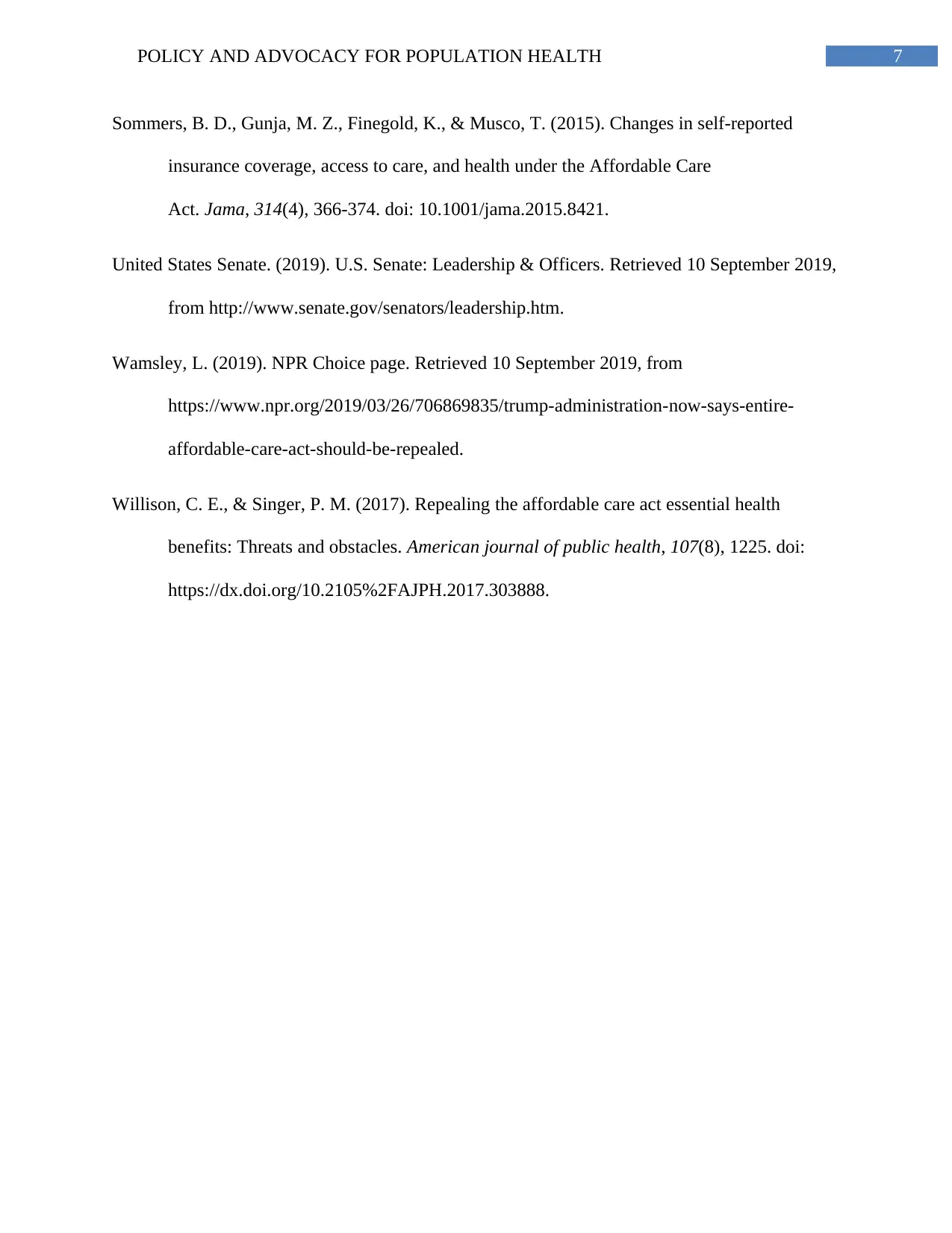
7POLICY AND ADVOCACY FOR POPULATION HEALTH
Sommers, B. D., Gunja, M. Z., Finegold, K., & Musco, T. (2015). Changes in self-reported
insurance coverage, access to care, and health under the Affordable Care
Act. Jama, 314(4), 366-374. doi: 10.1001/jama.2015.8421.
United States Senate. (2019). U.S. Senate: Leadership & Officers. Retrieved 10 September 2019,
from http://www.senate.gov/senators/leadership.htm.
Wamsley, L. (2019). NPR Choice page. Retrieved 10 September 2019, from
https://www.npr.org/2019/03/26/706869835/trump-administration-now-says-entire-
affordable-care-act-should-be-repealed.
Willison, C. E., & Singer, P. M. (2017). Repealing the affordable care act essential health
benefits: Threats and obstacles. American journal of public health, 107(8), 1225. doi:
https://dx.doi.org/10.2105%2FAJPH.2017.303888.
Sommers, B. D., Gunja, M. Z., Finegold, K., & Musco, T. (2015). Changes in self-reported
insurance coverage, access to care, and health under the Affordable Care
Act. Jama, 314(4), 366-374. doi: 10.1001/jama.2015.8421.
United States Senate. (2019). U.S. Senate: Leadership & Officers. Retrieved 10 September 2019,
from http://www.senate.gov/senators/leadership.htm.
Wamsley, L. (2019). NPR Choice page. Retrieved 10 September 2019, from
https://www.npr.org/2019/03/26/706869835/trump-administration-now-says-entire-
affordable-care-act-should-be-repealed.
Willison, C. E., & Singer, P. M. (2017). Repealing the affordable care act essential health
benefits: Threats and obstacles. American journal of public health, 107(8), 1225. doi:
https://dx.doi.org/10.2105%2FAJPH.2017.303888.
1 out of 8
Related Documents
Your All-in-One AI-Powered Toolkit for Academic Success.
+13062052269
info@desklib.com
Available 24*7 on WhatsApp / Email
![[object Object]](/_next/static/media/star-bottom.7253800d.svg)
Unlock your academic potential
Copyright © 2020–2026 A2Z Services. All Rights Reserved. Developed and managed by ZUCOL.





